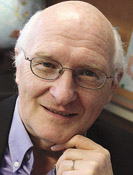Canadian Mennonite
Volume 13, No. 23
Nov. 30, 2009
Readers Write
We welcome your comments and publish most letters sent by subscribers intended for publication. Respecting our theology of the priesthood of all believers and of the importance of the faith community discernment process, this section is a largely open forum for the sharing of views. Letters are the opinion of the writer only—publication does not mean endorsement by the magazine or the church. Letters should be brief and address issues rather than individuals.
Please send letters to be considered for publication to letters@canadianmennonite.org or by postal mail or fax, marked “Attn: Readers Write” (our address is on page 3). Letters should include the author’s contact information and mailing address. Letters are edited for length, style and adherence to editorial guidelines.
MCC called to repent for anti-Israeli bias
Lisa Cataford is to be commended for her insightful response in the Oct. 5 issue, “MCC’s anti-Israeli response goes against God’s will for his chosen people.”
My wife and I were with a Christian group that visited Israel in April 2008.On the second day we ascended Mt. Carmel, heard about Elijah’s routing of the priests of Baal and also viewed the vast plain below. As we descended, two Israeli jets took off from the airstrip below. Within seconds they were high above us. As I was watching, the Lord got my attention. No words were spoken, but the impression was clear: “There is power there, but I have infinite power, and I fight for Israel” (see Joel 3:1,2; Zechariah 2:8,9).
Months later, at home, while thinking about or praying for a local situation, I received the following very clear message: “If you don’t soon have a heart for Israel, I will pass you by” (see Genesis 12:2,3). Another word came to me, equally to the point: “The time is short!”
The meaning of these messages is obvious and should be heeded by all. Mennonite Central Committee people responsible for the various anti-Israel statements and releases need to repent—soon. Judgment is on the horizon.
Speaking of occupation, according to Joshua 1:12-15, the land now “occupied” by Jordan belongs to Israel as well. It was given to Gad, Reuben and the half-tribe of Manasseh.
Israel grapples with ‘moral challenges’ of self-protection
Re: Sept. 21, Oct. 5 and Oct. 19 editorials.
Dick Benner fails to address a central issue: People who enjoy the fruits of American and Canadian sovereignty have no right to suggest that Israeli Jews should abandon their insistence on maintaining a sovereign Jewish homeland. This is what Mennonite Central Committee (MCC) has done in the story it tells about the Arab-Israeli conflict.
For its part, Christian Peacemaker Teams (CPT) in the West Bank routinely confront Israeli soldiers and settlers. They rarely “get in the way” of—or draw attention to—violence perpetrated by Hamas and Hezbollah.
Israelis, on the other hand, have taken risks and have died for peace. Israel withdrew its soldiers from cities and towns in the West Bank in the late 1990s, only to see these municipalities used as terrorist recruiting grounds during the second intifada. Israel withdrew from Lebanon in 2000, only to be attacked by Hezbollah six years later. Israel withdrew from the Gaza Strip in 2005, only to see an increase in rocket attacks and attacks from Hamas the following year.
Israelis have struggled with the moral challenges that come with being a sovereign people responsible for their own safety. Mennonites in North America can maintain their distance from the moral complexity of the world because others use force to keep them safe.
Israel’s history makes clear that pacifism is not the costly belief it once was. Mennonites in North America who support MCC and CPT are placing a burden on the shoulders of Israeli Jews they themselves do not carry.
If Benner feels blindsided by these observations, he should take it up with Mennonite theologian Ron Sider, who stated in 1984 that, unless Mennonites were willing to risk injury and death, they “dare never whisper another word about pacifism to our sisters and brothers in those desperate lands.”
In solidarity with Palestinians . . . against ‘Zionist hooligans’
On Oct. 17, Canadian Mennonite University (CMU), Winnipeg, hosted “A conversation with Norman Finkelstein” in conjunction with Canadians for Peace and Justice in the Middle East, Independent Jewish Voice and Canada-Palestine Support Network – Winnipeg. Finkelstein, a noted author and political commentator, was speaking on the subject of Israeli war crimes in the so-called Gaza “war.” As a founding member of the support network and an author of numerous articles on the Israel-Palestine situation, I commend CMU on taking this important step towards building peace in the world’s oldest conflict.
There are different ways to build peace. Where the road to peace is paved with dialogue, consensus-building and conflict-resolution, Mennonites have proven themselves very successful peacebuilders. But Mennonites may still have a few things to learn about peacebuilding in situations where one party or another refuses to deal in good faith.
The tendency of Zionist supporters of Israel, for example, to use accusations of anti-Semitism and other methods to intimidate and silence even mild criticism of Israel, is by now an established fact. Indeed, at the Oct. 17 event some young Zionist hooligans, presented with an invitation to sit down and converse with the featured speaker, instead took crass advantage of the situation to try to intimidate Finkelstein and to menace him with their physical presence.
What can peacebuilders do when aggressive parties like these won’t sit down and play nice? How can Mennonites “get tough” in such situations without condoning violence?
Some Mennonites remain suspicious of the word “solidarity,” with its socialist connotations—not surprising considering Mennonites’ ugly experiences with Soviet communism. But where good-faith conversation falls short, solidarity may succeed, and solidarity is exactly what the Palestinians need from us today.
Solidarity with Palestinians means standing with them against Israeli aggression and apartheid by condemning Israeli war crimes in Gaza, by calling for an end to illegal Israeli settlement-building on Palestinian land, and by joining the growing Palestinian-led campaign of boycott, divestment and sanctions.
When it comes to religions, it’s still either/or
Re: “In defence of the institutional church,” Oct. 19, page 11. While I share some of the concerns raised by Will Braun, I find his analysis simplistic.
First, I might question his conclusion that “individualized spirituality is not spirituality at all.” Look to the great mystics of the past or to even common folk from today. I believe in the axiom, “Beware of the individual without community,” and also, “Beware of community without the individual.”
Second, as for Braun’s illustration that some Mennonites are substituting yoga for small group meetings, I think some are participating in both small group meetings and yoga simultaneously.
William Closson James provides examples in his article, “Dimorphs and cobblers: Ways of doing religion in Canada,” that many Canadians are “cobbling” their religion with other religious disciplines. I suggest this is not what sociologist Reginald Bibby was referring to in his book Fragmented Gods, when he developed his metaphor of the consumer and the marketplace, but something more profound. Theistic religions, however, have always had stern warnings against this. For example, an individual cannot be both a Christian and a Muslim simultaneously, but must choose to be either a Muslim or a Christian.
In conclusion, Braun quotes a spiritual advisor: “The act of going to church, aside from what actually happens there, is the most important spiritual discipline.” He continues: “I think of the value of choosing to spend time with people of various backgrounds, ages and viewpoints. In the intersection of our lives I believe I can find something that I cannot find alone.” This is an interesting concept and deserves open dialogue by both people on the fringe of the church and by those who have never questioned their participation.
From Our Leaders
The question of denominations

Denominational, non-denomi-national, inter-denominational, post-denominational, trans-denominational . . . anti-denominational.
Increasingly we hear strongly worded negative critiques that assume that Christian denominations are passé, anti-ecumenical, egotistic, competitive or rigid; have tunnel vision; or are simply unacceptable in our postmodern world. Why not concentrate on being “Christian,” rather than focusing on a particular brand of Christianity?
I am increasingly uncomfortable with these growing—and largely unquestioned—assumptions. Allow me to point in some directions that would lead us down a different path:
• After 2,000 years of experience, we now know, without any doubt, that God’s church is an incredibly rich, divine/holy project. But it spans geography, history, culture, creed and structure.
Many have tried and thus focused on particular pieces that seem to be missing or weak in the other expressions.
• It is also clear that the nature of God and God’s plan for the church is truly “inscrutable,” and this “unfathomable-ness” is experienced daily by those who want to know and follow God. In Paul’s terms, the fact that we “see through a glass dimly” is an undeniable reality.
• One of the results of this is that no one person or church can claim to have got it all right. Many have tried and thus focused on particular pieces that seem to be missing or weak in the other expressions. This means that we complement, rather than compete with, each other.
• This perspective would align more closely with the Pauline insistence that the “oneness” of the church is part of what is given by God (Ephesians 4:3-6). Maybe, then, denominations are not a sure sign of failure, but signs of passionate, Spirit-filled efforts to be faithful to that which God has called us.
• Seen in this light, both the common foundations and the distinctives revealed in the “dim glass” are gifts from God to the church and part of God’s strategy to address the “inscrutability” of God. As such, they need not be signs of our—or God’s—failure.
• The presence of multiple human expressions of faithfulness in time and space may function like the gifts of the Spirit given to the same body. For example, we don’t think of the eyes as being a failure because they can’t hear. This is an important lesson about the grandeur of God, and the rich patience and incredible diversity that form part of God’s plan for the liberation and transformation of the world.
Having pointed to a different possibility, we must, however, readily acknowledge that denominations have not always acted according to this higher calling. They have used their particular gift as a hammer of exclusivity, rather than a piece of a quilt embracing the oneness of the body. This we must confess and pray for added wisdom. But failure to live up to a calling does not negate the value of the calling itself. Indeed, it may simply serve to underline its importance.
Family Ties
The last time

Last spring, my mother made the long trip from Pennsylvania to Winnipeg, to join our family as we celebrated our son’s graduation from university. At the end of the visit, as we said our goodbyes at the airport, Mom said, “I think this will be my last trip.” A shadow crossed my heart. I gave her a hug and replied, “I understand.” Happily, it wasn’t the last time. A year-and-a-half later, she was back in our home, this time to witness my ordination as a Mennonite minister.
Once again, she thinks it’s her last visit, and it may well be. I understand her reluctance to commit to such journeys. It’s one whole long day of travel between her home and mine, and includes stuffy airplanes, time-crunched transfers and over-stimulating airports. I find it to be exhausting and I’m younger than her by more than two decades. While I’m saddened that my mother can’t visit my home readily, I also respect her willingness to talk openly about “the last time(s)”.
Our lives are filled with endings as well as beginnings. Those who have lived many decades may be keenly aware of last times, as they relinquish former activities and pleasures, like gardening, driving, reading, playing the piano or living independently. Middle-aged adults might be aware of things ending in their lives: bodies that are increasingly stiff and creaky, and children becoming adults and leaving home.
Middle-aged adults might be aware of things ending in their lives . . . .
Young people, too, may feel the loss of endings, as they bid farewell to their childhoods or say goodbye to high school friends. Perhaps the first stage of their marriage—just the two of them—comes to an end as they begin family life with their firstborn child.
Of course, all of us know endings caused by death, something we may remember keenly at this time of year in our Memorial Sunday services or as we approach the Christmas holidays. Grief counsellors encourage people to name their losses openly and to be conscious of the endings they are facing. Such openness is seen to help people in their mourning.
Not all endings are accompanied by sorrow. Sometimes “the last time” comes with a sense of relief, with growth or with pleasure in success. An elder marks his 80th birthday with gratitude and satisfaction for a life well lived. The mid-life woman finds new horizons to explore. Young adults mark their maturity by making commitments to the church or by getting married. The ending of one stage brings the beginning of another.
In the gospels, we are told of Jesus facing a “last time” when “he set his face to go to Jerusalem” (Luke 9:51). The ministry and life he shared with his disciples in his home area of Galilee was coming to an end as he set out for Jerusalem and his final confrontation with the powers that would bring about his death. His willingness to face the end gave new life to many.
There is bravery in facing the last time unflinchingly, naming what is ending, grieving the losses and being open to the newness that is emerging. Such a consciousness enables us to live more truly in the present, savouring the richness of the moment.
God, Money and Me
A season for gift-giving

Thanksgiving in Canada has passed and our thoughts turn to the next holiday season of the year—Christmas—the time of year when we in the Christian community remember the birth of the Christ child.
The season includes church Christmas programs, banquets, family gatherings and, for some, family vacations. This has become one time of year when we in North America most emphasize the practice of giving gifts to others.
In our families many of us may pull tickets so that each person buys a gift for one other person. We may give our younger children money to purchase gifts for family, friends or teachers. In our churches we may speak of the baby Jesus as God’s gift to mankind, or of the gifts the Magi brought when they came to visit Jesus, and tie these to the idea of giving gifts to others during the Christmas season.
As this practice of gift-giving during the Christmas season has developed over the years, this has become a strong cultural concept that people from other cultures emulate when they immigrate to North America. It has become a mark of being a member of North American society.
Of course we also give gifts to children on their birthdays and to adults on significant birthdays.
But what about other practices of gift-giving? Are there other times and places when gift-giving may be practised? Of course, we also give gifts to children on their birthdays and to adults on significant birthdays. We present gifts at weddings and anniversaries, or to commemorate other important life events.
As people of other cultures migrate into our neighbourhoods and we begin to interact with them, we soon note that they also bring a variety of gift-giving practices unique to their cultural backgrounds. One notable practice is that of gifts related to travel. For people from some Asian countries, the practice is to take gifts along when travelling back to visit their families in their countries of origin. While in their home country they will purchase items there to bring back with them to present to family or friends in North America as a token of friendship.
Businesspeople who do a lot of travelling to other countries to purchase or sell their products also learn the importance of giving gifts in some cultures as a part of business interactions. In some cultures it may just be an incentive to complete a financial transaction. In other cultures it may be a sign of relationship—and business is about relationships.
What motivates you to give gifts? Is it a business transaction, a cultural expectation, or an expression of love and gratitude? For followers of Christ, reflecting on the blessings we have received from God should naturally lead to a desire to pass on those blessings to others. One way is through the giving of gifts.